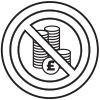
Whether you’re an NHS or private company healthcare worker, you should be claiming your yearly tax rebates. Tax relief for key workers like you is a huge and complicated topic, but RIFT can cut through the red tape and get back the overpaid tax HMRC owes you. Private healthcare and NHS tax refunds cover everything from travel costs to uniform laundry – and with an average 4-year healthcare worker tax rebate stacking up to thousands of pounds, there’s no good reason to miss out.
If you're a healthcare worker it's possible to claim a tax refund on the following expenses:

RIFT Guarantee
If HMRC wants your refund back, we pay it.

No hidden costs
It's free to find out if you have a claim.

Peace of mind
Our expert team have reclaimed £380 million.

We do the hard work
94% want to claim again with RIFT.
It takes less paperwork than you'd think to make a healthcare worker tax relief claim. Here are the main essentials:
Another thing you'll need is a Personal Tax Account. These accounts are free, and mean you can keep all the important information from employers, banks and government departments safely in one place. RIFT will help you get yours set up if you're unsure what to do.
A lot of people miss out on their private healthcare or NHS tax rebates because they don’t understand how tax refund claims work. Many more never even realise that they qualify in the first place. Key workers from nurses and midwives to physiotherapists and healthcare assistants can claim tax relief when they travel to temporary workplaces or use their own money to cover the costs of their jobs. In some cases, they might already be getting some allowances from their employers – but that doesn’t necessarily mean they don’t still have a claim. If you’re not getting everything HMRC says you’re entitled to, you can claim back the difference as a tax rebate.
RIFT is the UK’s leading tax expert, so you’ll always know your claim’s in safe hands. Take a look at our tax refund calculator for a quick estimate of how much you’re owed.
When you claim your NHS tax rebate with RIFT, our unique RIFT Guarantee means that you don't have to worry about the taxman reclaiming any of your money. So long as you give us full and accurate information, if HMRC disagrees with the amount that we've claimed and ask for the money back, we'll pay it. It won't cost you a penny.
We helped Caroline, an occupational therapist, to claim back the healthcare worker tax rebate she deserved. Caroline works for the NHS. She runs two weekly clinics in her local hospital and also visits clients at home. Every day, her mileage ranges from 10 to 50 miles. Caroline gets 15p per mile for her travel, which she claims back by filling in mileage sheets.
At the end of each tax year, Caroline sends copies of her mileage sheets to us at RIFT. We deduct the travel expenses she’s already received to work out how much extra she can claim. Caroline’s NHS tax rebate is usually about £350 for the year. For a four-year claim, that adds up to a very healthy £1,400.
Spending your life looking after other people shouldn't mean losing money that's rightly yours - and HMRC agrees. Whether you’re in private healthcare, a community midwife, a health visitor or locum consultant, you might be overpaying your tax and due a tax rebate.
A healthcare worker tax refund is for anyone who:
Tax rebates for nurses are HMRC’s way of acknowledging that your work sometimes means paying for travel and other costs from your own pocket. If your nursing job requires you to travel to patients' homes, for instance, then those homes will often count as ''temporary workplaces''. That means you'll usually qualify for a tax refund on your travel costs. Whether you're a district, neonatal or prison nurse, there's no reason to miss out on the tax relief your hard work earns you.
Other expenses that can count toward a tax rebate for nurses include the upkeep and cleaning of your uniform, along with any professional body fees you’re paying. For your work clothes or any equipment you might be paying for, you can’t include the initial purchase costs in your claim. Any cleaning, repair or replacement costs will usually count, though.
As for professional body fees and subscriptions, the deciding factor is whether they’re necessary for your work. Payments to organisations like The Royal College of Nursing or The Nursing and Midwifery Council are good examples. To qualify you for a refund, membership has to be either essential in landing your job or helpful in performing it. Even then, there are some wrinkles in the rules, so it’s always worth calling in a professional if you’re not completely sure where you stand.
Healthcare workers very often miss out on the NHS tax rebates they’re entitled to. Just like any other kind of worker, you could easily be owed a tax rebate for your travel costs, or for extra expenses like laundry bills for uniforms and work-specific clothing. Even if you're already getting some of your expenses reimbursed by the NHS, you could still claim tax back if you’re not getting everything HMRC allows. Talk to RIFT to find out exactly what you’re entitled to.
Jody is a nurse working through an agency. She typically has several different jobs to do each day, and uses her own car to travel between them. Her travels from home to the first job of the day and her journey home aren’t covered. All her trips between jobs during the day qualify, though.
There are many more examples of legitimate work expenses. If you're paying for subscriptions to professional bodies like the Royal College of Nursing, you might qualify for an NHS tax refund on them. Whatever you're shelling out for, it needn't be complicated to claim. In fact, many of your out-of-pocket costs can be claimed as Flat Rate Expenses. These are simplified claims that estimate what your typical costs might be. You probably won’t get back everything you’re owed this way, but there’s a little less paperwork involved.
Travel to and from temporary workplaces is usually the biggest chunk of any healthcare tax refund. That said, HMRC’s got very strict rules about the types of travel that count. For your mileage to qualify as an eligible (“tax deductible” in HMRC’s language) expense, your workplace needs to count as “temporary”. As a basic rule of thumb, this means that you’re working there for less than 24 months on the trot.
So, for example, an everyday commute to a steady workplace won’t earn you a healthcare worker tax rebate. Also, if the travel isn’t strictly necessary to your work, it won’t count toward your tax rebate. This sort of thing might sound obvious, but misunderstandings over complex journeys land a lot of people in hot water with HMRC each year. It can be an easy, but often damaging, mistake to include some “personal” travel in your mileage claims. At the same time, people get tripped up all too often by the “temporary workplace” rules. For example, if you travel to a number of hospitals over the same area, you might expect them all to count as temporary. However, if your mileage and costs don’t vary much between locations, HMRC might decide that the entire region is your permanent workplace.
Other tricky situations to deal with include subsistence costs while you’re on the road for work. Anything from accommodation to food bills can count toward your claim, as long as they’re a necessary expense of your job and you’re paying for them yourself.
Depending on your employer, you might find yourself getting reimbursed for some of your travel and work costs. HMRC has set out some “Approved Mileage Allowance Payment” (AMAP) rates for essential work journeys. The NHS has its own rates as well. Either way, if you’re not getting the full amount HMRC allows for, you’re usually in line for a tax refund to cover the difference.
Remember: the best advice is to get the best advice – and that means talking to RIFT.
Healthcare tax rebates can quickly get complicated, especially when there are training and other educational expenses to deal with. The key rule to follow is that your tax refund claim can only include expenses that were absolutely necessary for your work.
With things like training costs, it’s important to remember that there’s more than just the basic fees to consider. Travel to and from an eligible course or training session can also count toward your claim, potentially including any subsistence costs you run up along the way. Talking to a tax specialist is a really good idea before you start making claims based on training, though. The fact that a particular course is compulsory for you isn’t always enough to claim tax relief on its costs. HMRC won’t necessarily agree that paying for training to prepare for a role is the same as running up expenses performing your actual duties.
Certain types of healthcare work involve paying fees or subscriptions to professional bodies. Examples might include the BMA, the GMC or the MDO. As always there are some criteria that need to be met for a particular fee to be eligible for tax relief. However, it’s definitely worth keeping good records of what you’ve spent on these types of work costs.
The costs that can contribute toward healthcare worker tax rebates go far beyond your basic travel expenses. For example, any money you spend on cleaning, repairing or replacing specialised clothing, instruments or equipment can earn you tax relief. Again, though, these costs have to be essential and exclusively for your work.
No, healthcare worker tax refunds are for anyone working in healthcare who pays from their own pocket for the essential costs of the job. Depending on the work you do, that might include travel to temporary workplaces, upkeep or replacement of work clothing, fees to professional bodies and more.
If you’re required to wear a uniform or other specialised work clothing in your job, then you might qualify for a healthcare tax rebate for its upkeep. You do have to be paying your laundry costs yourself to claim anything, though. If your employer provides you with free use of a laundry room, for instance, you can’t claim any tax back – even if you still choose to do your laundry at home.
When you make a healthcare refund claim, you can use your receipts to prove the eligible expenses you’ve paid out. You’ll then be able to claim back the tax portion of those costs as a refund. If you’d prefer to keep things simple, you could use “flat rate expenses” instead. If you do this, rather than keeping records of what you’ve spent, you can use the government’s own estimated figures. For example, nurses can claim a yearly tax rebate of £125 using the flat rate expenses system.
Yes, laundry and replacement of scrubs count as “tax deductible expenses” for doctors. As with other kinds of allowable expense, though, you can only claim tax back if you’re paying the costs yourself and they’re essential for the work you do.
Using receipts to claim a healthcare worker tax refund is the best way to get sure you get back everything you’re owed. However, even if you don’t have all the paperwork to prove your expenses, you could still make a claim. Many roles in the healthcare industry are covered by the government’s flat rate expenses system. This means you can claim back a fixed amount each year instead of keeping detailed records of your spending, with your refund amount depending on the job you do.
What is a tax return and how much tax do I owe? These are some of the top questions we answer at RIFT, and the answers depend on your basic circumstances. If you’re employed and taxed via PAYE then your tax is handled before you even get paid. Even so, it’s easy to end up paying too much if you’ve got essential work travel and other costs to deal with. If you’ve got other sources of income, you may find yourself filing Self Assessment tax returns as well, to report your additional earnings. These are the same kind of tax returns filed by self-employed people, who can’t use the PAYE system to handle their tax automatically.
Tax returns can be difficult to get right and downright dangerous to get wrong, even accidentally. If you need to submit one, whether it’s because you’re self-employed, the director of a company or for any other reason, talk to RIFT. With our help, you’ll never miss a deadline or an opportunity, and you’ll always be on HMRC’s good side.
If you’re switching to self-employment, you need to get yourself registered for Self Assessment as soon as possible after you start trading. There’s a hard deadline of the 5th of October in the year you started your self-employment. If you don’t hit that, you’re lining up some painful Self Assessment tax return penalties for yourself. With RIFT on your side, though, you’ll always know your tax paperwork’s getting expert attention.
Being self-employed in healthcare doesn’t mean missing out on tax relief. When you’re in the Self Assessment system, many of the everyday costs of staying in business can be used to bring down the tax you owe. You can find everything you need to know on our Self Assessment tax return pages, including all the important tax return deadlines and the common tax return mistakes people make.
Tax rebate claims can get complicated when your employer already covers some of your costs. At RIFT, our tax experts know HMRC's rules inside and out. We'll get back the tax you're owed and never claim anything you're not entitled to. That way, you get the most out of your yearly healthcare tax refunds and still stay in the taxman's good books!
Finding your feet back in civilian life can be challenging after Armed Forces work. While RIFT is making great progress fighting for a change in employer attitudes, many are still wary of taking a chance on candidates with military backgrounds. However, every year, more and more employers come to realise the immense benefits of having ex-Service members on the payroll. So many of the aptitudes and personal qualities you earn in Armed Forces life are incredibly valuable in the civilian world. You've worked hard building your skills and testing your character, and now there are entire sectors crying out to put both to use.
If you work in offshore healthcare, for example, you already know it's not for the faint of heart of weak of body. These are hard jobs in tough conditions, and not everyone is cut out for them. Military experience proves you're up to the challenge, but it also shows you can shoulder responsibility, handle leadership and inspire teamwork.
RIFT works with Service leavers every day, helping them transition into civilian life. So many of them have never had it explained to them that they can continue claiming tax refunds after leaving the military. RIFT helps them make the most of their new careers, while reclaiming the overpaid tax they're still owed from their Armed Forces days. Tax rebate claims can reach back up to 4-years, so even if you've never claimed before it may not be too late. Whatever path you choose after a military career, talk to RIFT about getting back the tax you're owed.
Help your mates get their tax rebate and get extra cash in your own pocket!
At RIFT, we love it when happy clients tell their friends about us. We love it so much that we’re rewarding you for doing it!
We'll give you £50 for every friend you refer (T&Cs apply) that claims with us, plus we'll give you a £150 bonus when 5 people claim with us.
Simply tell us about your friend using our Refer a Friend form and we’ll get in touch to let them know you think they might have a claim.


30th July 2025
International Friendship Day 2025
International Friendship Day: How Supporting Mates with Money Advice Can Strengthen Male Friendships It’s unlikely y...
Read MoreWondering if you can claim a tax refund or need to submit a tax return? Use our online tools to find out if you're owed money by HMRC.
Do I Qualify?Speak to us 6 days a week.
Mon-Thurs 08:30 - 20:00
Fri 08:30 - 18:00 and Sat 09:00 - 13:00.
RIFT Refunds, The Cobalt Building, 1600 Eureka Park, Lower Pemberton, Ashford, Kent, TN25 4BF
Want to chat to a member of our team? Why not use our live chat to speak to an online advisor now?
Open live chatRIFTPROD2 - Subscriber